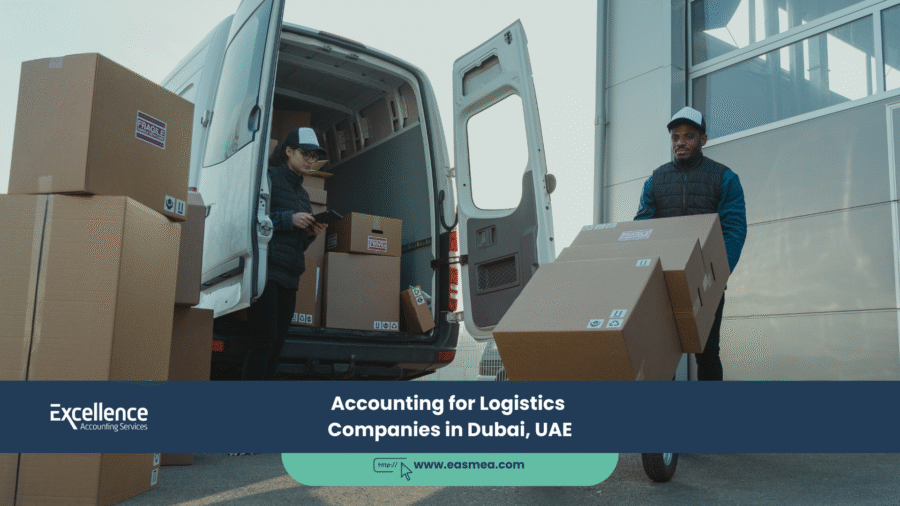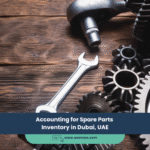Accounting for Logistics Companies: A Guide to Corporate Tax Group Registration and its Benefits
The UAE’s position as a global trade and logistics hub is undeniable. For companies operating in this dynamic sector—from freight forwarders and warehouse operators to last-mile delivery services—the financial landscape is as complex as the supply chains they manage. With the introduction of UAE Corporate Tax, a new layer of strategic financial planning has become essential. One of the most powerful tools available to logistics groups is the ability to form a Corporate Tax Group.
- Accounting for Logistics Companies: A Guide to Corporate Tax Group Registration and its Benefits
- Unique Accounting Challenges in the Logistics Sector
- Understanding Corporate Tax Groups in the UAE
- What Excellence Accounting Services (EAS) Can Offer
- Frequently Asked Questions (FAQs)
- Streamline Your Tax, Drive Your Business.
Forming a tax group allows a group of related companies to be treated as a single entity for Corporate Tax purposes. This isn’t just an administrative simplification; it’s a strategic move that can unlock significant financial benefits, streamline compliance, and provide a clearer picture of the group’s overall financial health. For logistics conglomerates with multiple subsidiaries, this can be a game-changer.
This comprehensive guide explores the unique accounting challenges faced by logistics companies in the UAE and provides a detailed roadmap to understanding, applying for, and benefiting from Corporate Tax Group registration. We’ll cover everything from eligibility criteria to the profound impact on your consolidated financial reporting.
Key Takeaways
- What is a Tax Group? A group of two or more resident companies, linked by at least 95% ownership, that can file a single tax return as one entity.
- Primary Benefit: Loss Offsetting. Profits from one group company can be offset by losses from another, reducing the group’s total taxable income. This is crucial for logistics groups with diverse, fluctuating business units.
- Simplified Compliance: Filing one consolidated tax return saves significant time and administrative resources compared to filing separately for each subsidiary.
- Elimination of Intra-Group Transactions: Transactions between members of a tax group are generally disregarded for Corporate Tax purposes, simplifying accounting and eliminating the need for complex transfer pricing documentation between them.
- Eligibility is Key: Strict criteria apply, including a 95% ownership threshold, all members being UAE residents, and having the same financial year.
Unique Accounting Challenges in the Logistics Sector
Before diving into tax grouping, it’s vital to understand the financial complexities inherent in the logistics industry that make such strategic decisions so important.
- Asset-Heavy Operations: Logistics companies manage vast, high-value assets like vehicle fleets, warehouses, and specialized handling equipment. This requires robust asset registers, depreciation schedules, and financing management.
- Complex Revenue Streams: Revenue isn’t straightforward. It’s a mix of freight forwarding fees, warehousing charges, customs clearance services, value-added services (like packaging), and last-mile delivery fees. Proper revenue recognition across these streams is critical.
- Multi-Currency Transactions: Dealing with international clients and partners means constant exposure to foreign exchange fluctuations, requiring diligent tracking of gains and losses.
- High-Volume, Low-Margin Transactions: Many logistics operations involve a high volume of transactions with thin profit margins, making accurate accounting and bookkeeping essential for profitability analysis.
These challenges underscore the need for sophisticated financial management, a role often supported by expert CFO services to guide strategic decisions like tax group formation.
Understanding Corporate Tax Groups in the UAE
As defined by the Federal Tax Authority (FTA), a Tax Group allows a parent company and its subsidiaries to be treated as a single taxable person. The parent company takes responsibility for filing the consolidated tax return and paying the Corporate Tax liability on behalf of the entire group.
A Tax Group is a strategic choice. It consolidates the tax position of multiple entities, providing a unified view of profitability and liability, which is invaluable for a multi-faceted logistics operation.
The Strategic Benefits of Forming a Tax Group for Logistics Companies
For a logistics group—which might have separate legal entities for shipping, warehousing, and local distribution—the advantages are substantial.
| Benefit | Impact on a Logistics Company |
|---|---|
| Consolidated Tax Filing | Reduces the administrative burden of preparing and filing multiple tax returns. This frees up finance teams to focus on more strategic analysis. |
| Intra-Group Loss Relief | A new, capital-intensive warehousing subsidiary running at a loss can have its losses offset against the profits of an established, profitable freight forwarding arm. This directly reduces the group’s overall cash tax payment. |
| Elimination of Intra-Group Transactions | The warehousing company charges the distribution company for storage. In a tax group, this internal transaction is ignored for tax purposes, avoiding complex transfer pricing issues. |
| Simplified Asset Transfers | Transferring a fleet of delivery vans from one subsidiary to another can be done without triggering a taxable gain or loss, facilitating operational restructuring. |
What Excellence Accounting Services (EAS) Can Offer
Navigating the complexities of Corporate Tax and the strategic decision of forming a tax group requires expert guidance. At Excellence Accounting Services, we provide end-to-end support for logistics companies.
- Eligibility Assessment: We conduct a thorough review of your corporate structure, ownership percentages, and financial years to determine your eligibility and the potential benefits of forming a tax group.
- Application Management: Our team handles the entire application process with the FTA, ensuring all documentation is accurate and submitted correctly, minimizing delays. We act as your dedicated UAE corporate tax consultants.
- Consolidated Financials: We assist in preparing the consolidated financial statements required for the group tax return, ensuring compliance with IFRS and UAE Corporate Tax Law. This includes robust account reconciliation services across all entities.
- Ongoing Compliance & Advisory: Beyond formation, we provide continuous support for annual tax filings, managing entries and exits of group members, and offering strategic advice on tax optimization. Our business consultancy services ensure your tax strategy aligns with your commercial goals.
Frequently Asked Questions (FAQs)
Yes, it is possible. However, if a Free Zone entity joins a tax group with a Mainland entity, the entire tax group becomes subject to the standard 9% Corporate Tax rate on its taxable income. The Free Zone entity will lose its potential 0% tax benefit on “Qualifying Income.” This is a critical strategic decision that must be carefully evaluated. For more details, you can read our guide on corporate tax for free zone companies.
The parent company must own at least 95% of the share capital in the subsidiary and be entitled to at least 95% of the profits and net assets of that subsidiary. This control must be demonstrable both directly and indirectly through other subsidiaries in the group.
They are eliminated for Corporate Tax purposes. If Subsidiary A (a warehousing company) provides services to Subsidiary B (a freight company), the corresponding revenue for A and expense for B are ignored when calculating the group’s consolidated taxable income. This greatly simplifies internal accounting.
Transfers of assets and liabilities between members of a tax group are also disregarded for tax purposes, provided the assets or liabilities remain within the group. This means you can move assets like vehicles or equipment between your entities to meet operational needs without creating a taxable event.
The primary risk is “joint and several liability.” This means that every member of the tax group is jointly and individually responsible for the entire group’s Corporate Tax debt. If the parent company defaults on the tax payment, the FTA can pursue any subsidiary member for the full amount.
Corporate Tax grouping and VAT grouping are separate. Your VAT group registration is not automatically affected. You can have a Corporate Tax group that is different from your VAT group. However, managing both requires careful administration, a task for expert VAT consultants.
The parent company must notify the FTA if a subsidiary no longer meets the conditions (e.g., ownership drops below 95%). The departing company will be removed from the tax group and will be required to file its own separate tax returns from the date it leaves. There can be complex tax consequences for assets that were previously transferred within the group.
No, it’s not a legal requirement. However, using a unified chart of accounts and, ideally, the same accounting system greatly simplifies the consolidation process. If different systems are used, a robust process for mapping and consolidating the financial data is essential. An accounting system implementation project can harmonize this.
No. A core condition for forming and maintaining a tax group is that all members must have the same financial year. If your subsidiaries have different year-ends, you would need to legally change them to align before you can apply to form a tax group.
If a company that would otherwise be eligible for Small Business Relief joins a tax group, the entire group’s revenue is aggregated. If the group’s total revenue exceeds the AED 3 million threshold, the benefit of Small Business Relief is lost. It may be more tax-efficient to keep the small entity separate from the tax group. Read more about the Small Business Relief scheme to make an informed decision.
Conclusion: A Strategic Imperative for Growth
For logistics companies in the UAE, Corporate Tax Group registration is more than a compliance option; it is a powerful strategic tool. It enables groups to operate more efficiently, manage cash flow effectively, and reduce their overall tax burden. By consolidating their tax affairs, logistics groups can present a clearer, more unified financial front, allowing them to focus on what they do best: keeping the wheels of commerce turning.
The decision requires careful analysis, but the benefits of simplified administration, intra-group loss relief, and streamlined transactions make it a compelling proposition for any logistics group aiming for sustained growth in the UAE’s competitive market.
Streamline Your Tax, Drive Your Business.
Let Excellence Accounting Services assess your structure and manage your transition to a tax group, ensuring maximum benefits and full compliance.




